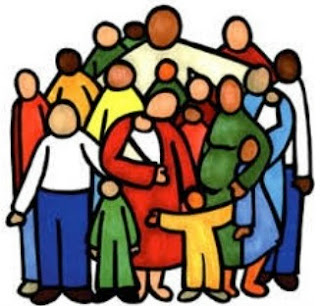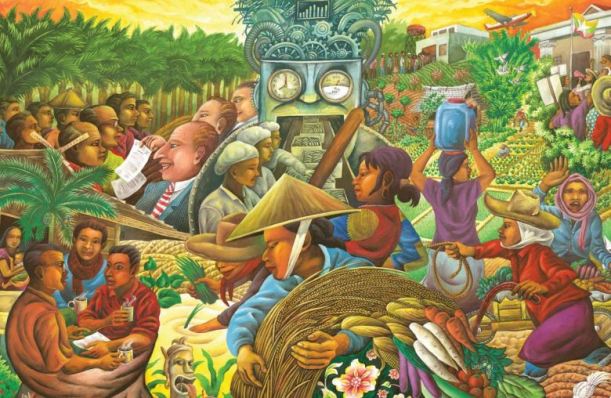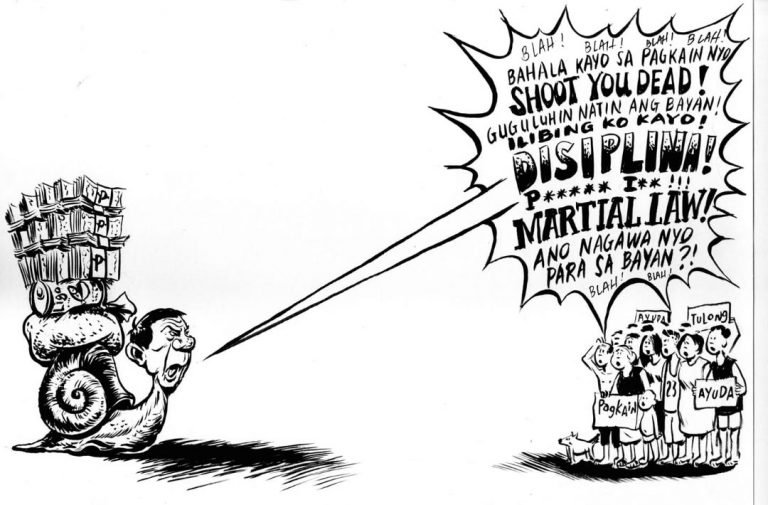Dss. Norma P. Dollaga, KASIMBAYAN

Ps 104:1, 24, 29-31, 34
Acts 2:1-11
1Corinthians 12:3-7, 12-13
John 20:19-23
It is a courageous act to admit recognize that we are afraid. Great people- heroes, and martyrs alike , and those who are willing to give their lives for the sake of others are people who acknowledge their own fears and anxieties. Upon the death of Jesus, his disciples were together collectively feeling the chilling effect of the state/empire terror. Their leader was slapped with trumped-up charges, he was arrested, humiliated before the public and meted with capital punishment (death penalty) by hanging on the cross. The once leader who healed the sick, and preached radically about God’s Kingdom, who saved the woman from stoning to death, who exalted the humble and meek, who was in the company of the dirty, marginalized and outcasts is now dead. He, the champion of the poor who critically engaged the ruling system and never shown any favorable -patronizing attachment with the hypocrites and powerful is now gone. His disciples must be weary and anxious. They could be the next victim of the terror. If the intention of the empire is to eliminate its perceived enemy, the logic was to “get them all.”
The disciples were afraid. They could not deny their close association with him. I was dangerous then to be identified with Jesus. that The security information must have done a dossier of them and their whereabouts. Besides, the state must have suspected them that they were hiding the body of Jesus.
They were hiding, as a way to handle their own fear. The fear is borne out of reality that they could be apprehended .and attacked at anytime. They rather not expose their vulnerability . They still have a mission to carry on. In the mean time taking a side step was a wise decision.
However, fear did not immobilize them. The Spirit –the Life-giving-Power , the resurrection had given them hope and overcome their fear. The fear was replaced by PEACE. They received the SPIRT ( he BREATH) – the power that will transcends their worries and anxieties- which came upon them. They were not forever lock downed by fear and side-step. The “retreat” was just temporary , and they went ahead with the work and the mission . Perhaps they were still afraid. The enemy must constantly watching their moves. The church was founded by faithful disciples who were given the power of Spirit and the message of Resurrection to carry on what was entrusted by them,
And so, we still have prophets and missionaries who in the midst of fear and error of the empire, are steadfast in their calling. The church ,the movement of prophets and believers of God’s Kingdom is a testimony that the teaching of the righteous , the love of humanity and genuine interest to serve the people will never die. It as like the message of the hymn by Frederick William Faber,1849:
“ Faith of our fathers (ancestors) ! living still
In spite of dungeon, fire, and sword.
O how our hearts beat high with joy
Whene’er we hear that glorious word!
Faith of our fathers (ancestors) , holy faith!
We will be true to thee till death.”
Today, we seem to be swimming in the river of our tears. We are both mourning and angry. We hunger and thirst for justice. We do not even want the breathe in the air that being breathe out by the tyrant and the murderers. The death of George Floyd in Minneapolis in U.S.A enraged us all. He was a black man who died after a policeman kneel on his neck brought unspeakable pain and anger . The killing of humanitarian activist Jory Porquia manifest a glaring callousness and impunity in the time of COVID 19 pandemic and lockdown . Her daughter was one amongst detained when her group would offer an memorial honor for him . Her daughter said that the case of his father has not been investigated, yet the mass arrest of those who would mourn for his father had been filed on the court. Today, we have heard a sad news about the killing of Carlito Badion a leader of KADAMAY , an urban poor organization. His body was found along the highway of Ormoc City on May 28,2020Prior to hos murder he had receiving harassments and threats, the military red-tagged him and eventually silence him. But their dead bodies still speak to us. We see the people heeding their voices, resurrecting them through our bodies.
We are like the psalmist who once said. “ Out of the depths I cry to you, LORD” (Psalm 130:1b).
WE suffer much from this impunity. Like the disciples of Jesus , we feel how dangerous it is to transform our grief and anger into prophetic action. But like the disciples of Jesus, they were given the power to keep the mission going. There will be an assurance of PEACE in our hearts . In the name of those who suffer from bigotry, discrimination and exploitation, the Spirit will empower us to pursue the cause of overcoming evil lurking within the systems of our society. The inspiration of the life, work, ministry and mission of Jesus will be the LIGHT that will guide us. Those who went ahead of us who dared and risked their lives for the sake of others will be our inspiration to carry on. They shall live in our hearts and in our daily prophetic and pastoral work.
Breathe on me, Breath of God
As we are mourning and grieving
The deaths of many people–
Young, old, and vulnerable ones.
Breathe on me, Breath of God
When we are anxious and scared
From a disease caused by a virus,
Unseen to our eyes yet occupying bodies.
Breathe on me, Breath of God
When we are angry and enraged
With a hostile policy that is anti-poor,
Leading the lowly into greater vulnerability.
Breathe on me, Breath of God
As we repent for our insensitivity
And privilege of having more
That led us to blend thoughts and perceptions
In a discourse of resilience and obedience to laws,
Now weaponized against our own people.
Awaken us to our connivance
with anti-poor policies.
Help us to see that
We benefit because we have means,
We are secure and privileged
Even with a semblance of a vacation.
Raise our awareness that
This lockdown in poor communities
Means suffering, hunger, and tears,
Even as we preach sacrifice for the benefit of all.
Breathe on me, Breath of God
As we pray for those who care for the sick and dying
And those who look for cures and scientific explanation.
Release us from ignorance and myths
that may proclaim what is factual and true.
Breathe on me, Breath of God
As we demand a medical approach to a health crisis,
As we clamor for free testing and health services for the ill,
As we assert a rights-based approach to this problem.
Breathe on me, Breath of God—
Spirit, Ruah, She Who Hovers Over,
The MOVEMENT THAT NEVERS EXPIRES,
Movement like the Wind
That cannot be locked down.##




 Psalm 66:1-7, 16, 20
Psalm 66:1-7, 16, 20
